Members of the UW School of Medicine and Public Health’s class of 2023 followed a myriad of paths to the university to pursue their degrees under one unifying vision: to advance health and health equity. Poised for their next career steps in clinical care, public health, genetic counseling and research, the school’s recent graduates have shown their commitment to remarkable service, outstanding education and innovative research.
On Friday morning, May 12, the Doctor of Medicine Graduate Recognition Ceremony honored the school’s newest class of doctors at the UW–Madison Memorial Union. The school’s four other health professions programs — Doctor of Physical Therapy, Master of Genetic Counselor Studies, Master of Physician Assistant Studies and Master of Public Health — also held ceremonies throughout the week to celebrate graduates, as did many basic sciences graduate degree programs affiliated with the school. Festivities culminated in the official UW–Madison commencement ceremony for doctoral, master of fine arts and health professions graduates on Friday evening.
Resilience forged during the pandemic
At the MD Graduate Recognition Ceremony, speakers took the students and their families back in time to the period when the COVID-19 pandemic swept the globe in early 2020 and disrupted students’ educational and personal lives. By recounting the past, speakers highlighted the incredible resilience students exhibited and the tenacity with which they pursued their studies.
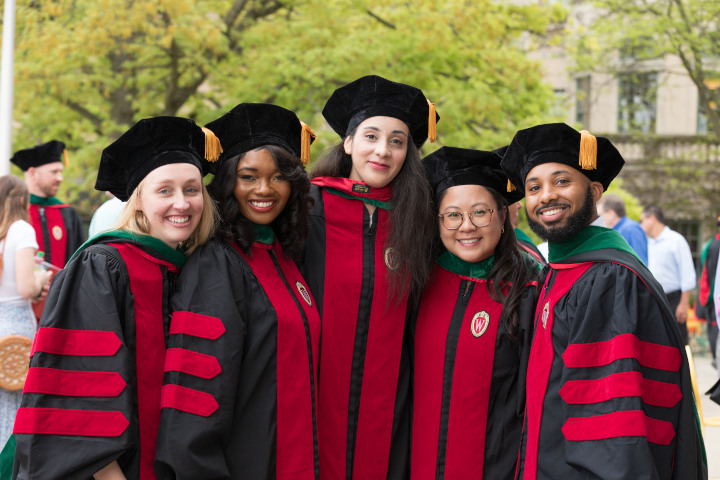
Dr. Robert N. Golden, dean of the school, shared how the collective wisdom gained during the most catastrophic moments of the pandemic ended up re-shaping the medical profession and underscored the importance of melding medicine and public health, an integration that is the hallmark of the school’s academic programs.
“What does this mean for you, our new graduates?” he posed. “To paraphrase an ancient curse: ‘May you practice medicine in interesting times.’ But please remember that this ‘curse’ is also a blessing. There has never been a more exciting time to enter the field of medicine. Collectively and individually, you will shape the future of medicine and health.”
The MD class of 2023 chose Dr. Sam Lubner, associate professor of medicine, as its faculty speaker. A renowned educator, he serves as the mentor for Gunderson House, one of the five learning communities that medical students are placed in to promote connections, belonging and well-being.
Though well-known for his sense of humor, Lubner struck a serious tone to acknowledge everything students experienced and overcame during their time in the school, saying they were challenges educators and students overcame together.
“As I was preparing this speech, I was thinking about what an incredible, chaotic, influential experience you have had over the last four years,” Lubner said. “What has given me so much to believe in over the past four years is you, class of 2023. When we shut everything down and went all-virtual in a hurry, you adapted on the fly and stood ready for whatever came next. You asked the simple, fundamental question you need to be a great doctor: ‘What can I do to help?’ And you held the belief in your heart that you could.”
Nasser Lubega was chosen by his peers to be the student speaker for the ceremony. Lubega grew up in Kampala, Uganda, and later graduated from the University of St. Thomas in St. Paul, Minnesota with a degree in biochemistry.
In his speech, he drew on the many twists and turns his life has taken and shared his philosophy for learning from moments of adversity.
“As a member of this class, I must say that it has been quite a journey,” he said. “It seems like only yesterday we were gathered for our white coat ceremony. From those initial days as enthusiastic students in the ‘before times’ to witnessing our transformation into confident, skilled medical professionals, it’s evident that we have tenaciously endured the ‘unprecedented times.’ Undoubtedly, we have much to be proud of.”
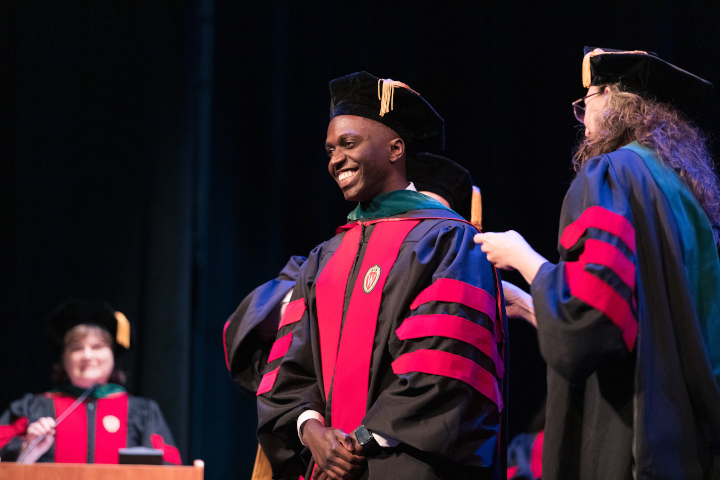
Lubega recalled his experience in an international boarding school in Kenya before moving to the United States, telling stories of humbling experiences when he, along with his boarding school classmates, encountered different cultures and perspectives for the first time.
Lighthearted banter involved debates about the cuisine of other cultures, but some conflicts went deeper, like two schoolmates from countries at war with each other who were able to relate from a place of shared humanity and kindness. Years later, these lessons shaped Lubega’s medical school experience.
Lubega was elected to the Gold Humanism Honor Society and was active in the school’s chapter of the Student National Medical Association, a group dedicated to addressing the health needs of underserved communities and communities of Color. He devoted significant time to mentoring young people, particularly young Black students.
In our world of increasing complexity, our generation of physicians will be uniquely positioned to lead and safeguard our core values, not only as professionals, but most importantly as human beings.
- Nasser Lubega, MD
“We will need to continue to embrace technology, and innovation, but my hope is that we remember that at our core we are a part of an interconnected community. Belonging is the soul food, the lifeblood, from which compassion and empathy grow. And only with compassion and empathy can we endure all the challenges that lie ahead.”
Among the 156 graduating medical students was Kelly Kuehl, a native of Sherwood, Wisconsin, whose journey into medicine started as a dream when she was 12 years old – not just an aspirational idea but an actual dream while she slept one night, and thankfully one she remembered the next morning.
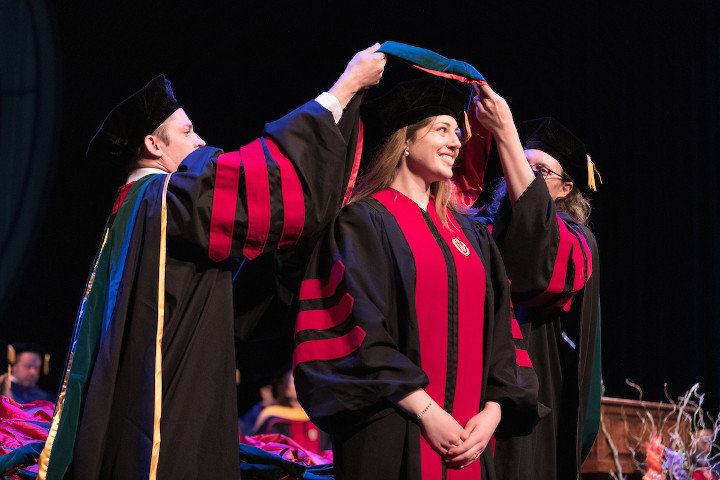
Almost a decade and a half later, Kuehl’s hard work turned the dream into a reality. After graduation she will pursue her residency training in family medicine through the school’s Department of Family Medicine and Community Health.
“I am so excited to be a primary care doctor and to be able to make a positive impact on my patients and community,” she said. “What I look forward to most of all is being a trusted advocate to all patients that come through my door. I want to make health care more accessible and effective for those who need it the most.”
Kuehl is passionate about engaging the intersections between disability and health care. Throughout medical school she worked with members of the UW–Madison Waisman Center, which is dedicated to advancing knowledge about human development, developmental disabilities and neurodegenerative diseases. She also founded a student chapter at UW–Madison of the American Academy of Developmental Medicine and Dentistry.
“Caring for people with intellectual and developmental disabilities has been a passion of mine ever since I worked as a caregiver for adults with disabilities as an undergraduate,” she says. “Becoming a primarily care doctor who has experience and comfort in working with people with disabilities in particular will offer a powerful opportunity to make a real difference in my patients’ lives.”
Finding a calling in connecting with others
Happy Xiong is one of 47 graduates who earned a Master of Public Health degree. For Xiong, an experience during his final project evoked memories of his own childhood. He was working to assess fresh produce needs in the Dane County area when the taste of freshly picked cucumbers brought back memories of sunny days in his family’s garden, following behind his grandmother and parents.
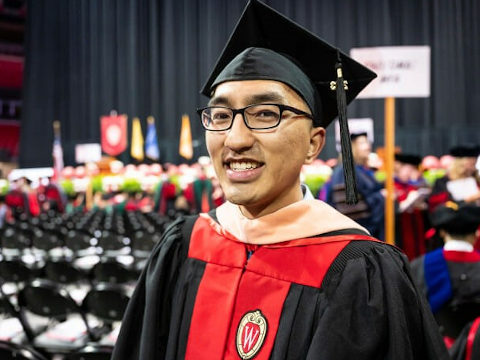
The parallel between his upbringing and his public health studies brought special meaning to his work alongside community partners exploring new connections for public gardens with food pantries. Xiong is a strong believer in the idea of “food as medicine” and hopes to be able to pursue food security measures in his future career as a public health and health care professional.
But his time in the school is not over yet, because Xiong will be a member of the incoming MD program class joining the school in fall 2023.
“I hope to be able to learn further what it means to practice public health as a medical provider,” he said. “I hope to be able to use this knowledge, along with my new passion for food security, to make a difference in my Hmong community in the future.”
Other health professions graduates are also eager to make their mark on their professions, including Lucas Pereira, one of eight graduates this year from the Master of Genetic Counselor Studies program. Pereira says that the most meaningful part of their studies was the connections with both peers and patients.
“I’ve gotten to meet so many people, from different walks of life and learn their stories,” they said. “It’s all helping me grow to be a better genetic counselor and better person.”
During their time in the program, Pereira earned two supplementary certificates in Pharmacogenomics and Consumer Health Advocacy, completed a rural health track at Marshfield Clinic, and won a scholarship to attend a conference on LGBTQ+ health.
Pereira will move to Boston after graduation and work as a cancer genetic counselor in a safety net hospital.
“Genetics is considered a ‘luxury’ form of healthcare, and I want to break those barriers down, especially for immigrant communities and queer patients,” they said. “I also hope to become certified as a Portuguese Medical Interpreter to better serve other Brazilians and Portuguese-speakers.”
For Kathy Eich, graduating with this year’s Master of Physician Assistant Studies program cohort of 55 students means embarking on a brand-new chapter of life at the age of 54. When she was nine, Eich took up the viola. By the age of 11, she was a prodigy. Throughout her musical career she played in ensembles across the country and performed with stars ranging from Itzhak Perlman and to the musical group Earth, Wind and Fire. But one day something shifted, and Eich decided to end her musical career.
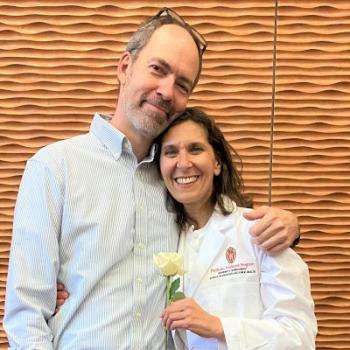
She felt called to a healing profession. At 46 years old she began to pursue pre-requisite studies in the sciences, then matriculated into the Master of Physician Assistant Studies program.
“As a mom to two lovely daughters and as a wife, I had to accept that my role in the family would change. It was a difficult choice, and one that I did not take lightly,” she said.
“In the end, it was worth it.”
Eich noted that the program and its varied degree tracks are an excellent fit for students who pursue their degree later in life.
“On rotations, we are learning the art and practice of medicine, and we are growing our insights and our ability to connect with and inspire a patient to better health,” she said. “I appreciated the preceptors that I had who were of the belief that you can always connect with someone. To witness their ability to do so despite obstacles motivated me to grow my skills, and learn even more about my patients, their lives, health and struggles.”
Class of 2023 by the numbers
- Doctor of Medicine (MD): 156
- Training in Urban Medicine and Public Health (TRIUMPH): 11
- Wisconsin Academy for Rural Medicine (WARM): 21
- Medical Scientist Training Program/MD-PhD (MSTP): 6
- Doctor of Physical Therapy (DPT): 40
- Master of Genetic Counselor Studies (MGCS): 8
- Master of Physician Assistant Studies (MPAS): 55
- Master of Public Health (MPH): 47
- Master of Science in Biotechnology: 26
- Basic sciences graduate students: Students completed studies in the school’s 14 graduate programs and 4 affiliated graduate programs